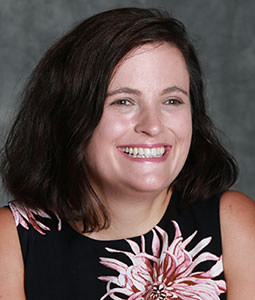iSchool faculty member Clayton Copeland’s work comes from her heart and is making a difference for those who are differently abled. The term differently abled focuses on the individual’s autonomy.

During her time at the iSchool, Copeland strives for progress in ensuring equitable access to information. Her research is fueled by the belief that every person has unique abilities that should be accepted.
“I’m just Clayton and I happen to use a walker,” Copeland says, never having thought of herself as having a disability or being disabled.
From an early age, Copeland was taught to celebrate her own unique abilities and the unique abilities within all human beings. She learned that everyone has challenges — some more visible to the outside world than others. She was born three months prematurely and, as a result, uses a walker. Uncorrected, she has vision in one eye.
Growing up, Copeland fell in love with the library. She attended the Thornwell School in Clinton, South Carolina, working in the library until she graduated. She was deeply inspired by her school librarians, Ellen H. Ramsey and Vicky Culbertson, who are also alumnae of the iSchool. Ramsey and Culbertson always made sure that every student felt welcome. Copeland's desire to make the kind of difference they had made for her for other children, eventually led her to earn a Ph.D. in Library and Information Science from the CIC.
“I wanted to do something in life that would make a difference, and Mrs. Ramsey and Mrs. Culbertson had certainly made incredible and innumerable differences in my life,” Copeland says about why she chose this field of study, “I thought if I could give what they had given me to just one child that would be an amazing privilege and honor.” And she certainly has.
In 2007, she received a fellowship for the iSchool’s Ph.D. program from the Institute of Museum and Library Services and moved to Columbia. Her goal was to delve into a topic that would really make a difference for others. Literature in library and information science was well-intentioned, but there was an exceptionally limited amount of scholarship exploring lived experiences of library patrons with disabilities, Copeland says.
People were being written about, but their own voices were not being included.
The people who experience challenges firsthand know most of all what their needs are and how they can be met.
With these ideas in mind, Clayton Copeland got to work.
Her dissertation focused on the lived-experiences of differently-abled and typically-abled people to understand the extent of library accessibility. Throughout the process, she determined that many aspects of disability are socially constructed by architectural and societal barriers and misperceptions, among other factors. Through fostering awareness, we also have opportunities to foster greater accessibility.
“It’s not that a person is disabled innately,” Copeland said. “Does the disability exist because the person needs to use a walker? Or does it exist when the environment is not accessible?”
Copeland’s current research collaborating with professors Dick Kawooya, iSchool, and Eric P. Robinson, SJMC, uses the universal design concept. Their research focuses on equitable access for blind, visually impaired, and print-disabled students (BVIPD). With grants from the CIC, the Provost’s Excel Grant Program, and the Institute of Museum and Library Services, they are working to build a campus accessibility partnership model between Disability Services Offices, academic libraries in the Southeastern Conference, and institutions of higher education.
The goal is to “improve equity of access for BVIPD students and directly impact their degree completion rates and the overall quality of their educational experiences,” Copeland says. The goal of this groundbreaking work is to help ensure that everyone has access to education everywhere and every time.